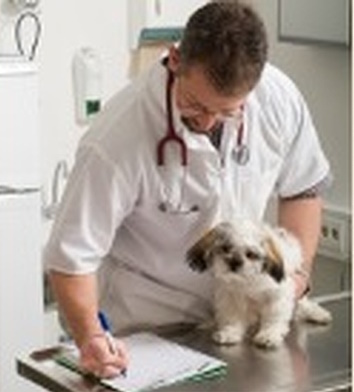Parvo Symptoms In Dogs And Puppies
Being able to recognize Parvo symptoms is extremely important when expecting a new puppy. Why? Because the Parvovirus is extremely dangerous and while this virus can attack dogs of all ages, it is most prevalent in puppies.

The Parvovirus is a highly contagious and often deadly disease. It is so powerful that if one dog has it, it can be passed along very easily to all other dogs he encounters.
Much more serious is the fact that once a dog is infected with Parvo they are not likely to survive without immediate treatment.
Parvo attacks the white blood cells, the heart muscles, and the
gastrointestinal tract in your dog. The virus will destroy all vital organs
until they no longer function.
Parvo symptoms are very severe and should leave no doubt in your mind that something is wrong with the dog.
Parvo can cause heart
inflammation for younger dogs and intensive care should be administered
right away.
From dog vaccines for rabies and parvo to shots for puppies, Revival Animal Health offers a selection of canine vaccinations.
Parvo Symptoms - Take Notes!
Parvo symptoms are extensive. While there are other diseases that may exhibit similar symptoms, if any of the following symptoms are seen, don't take chances. Get the affected pet to the vet right away.
- The first of the many Parvo symptoms is diarrhea. If your dog's excretion is watery and foul-smelling it may well be a sign of Parvo.
- The next of the many Parvo symptoms is dehydration. If they have diarrhea then dehydration is next. If your dog continually excretes more waste than fluids it has taken in, the dehydration might be lethal. They should be given soup-based foods and plenty of water.
- The next symptom is lethargy. If your dog no longer wants to play, run, or exercise, they are more
than likely sick.
- If your dog is vomiting, there is a reason. Aside from getting into the garbage, dogs do not usually vomit unless they are sick.
- The next of the many symptoms is a loss of appetite. If they are unwell, they will not eat their
food. If they skip two meals or more, you should be concerned. It is not simply a sign of a picky eater.
- A serious sign is a bloody discharge. This is the worst symptom and if seen, should be treated immediately. This applies to blood in the waste and the vomit. If you see this, your dog has hit the crucial stages of Parvo and needs immediate medical attention.
Along with bloody discharge there will usually be a high fever. If your dog exhibits both of these simultaneously, there is no time to waste, he should be taken to the vet right away.
So What Are The Causes?
Parvo is not actually a rare disease. All dog ages and types are susceptible to it.
Even if they are vaccinated early, this isn't
a guarantee that they are 100% protected. There is a window between the
acquired antibody protection that puppies have from
their mother, to the time when their vaccination protection kicks in, that they
are vulnerable to this infection.
This is why it is so important that puppies be isolated from all other dogs until they are considered to be protected.
- Dogs that have the disease can contaminate other dogs by way of their feces (you have seen dogs sniffing at such deposits - right?).
- The virus can also be present in their hair and on their feet, plus any objects they routinely use such as their water bowls, crates, beds., etc.
- Even their owners could spread it by picking it up on the soles of their shoes, or brushing up against their infected dog.
The real cause of Parvo remains unknown. The disease was discovered in
1978 when it was spread through a dog show.
Humans and cats are not susceptible to it, but it is suggested that the virus is a vaccine mutation and contaminant.

Parvo Treatment - Don't Delay!
Treatment for the Parvovirus must be immediate and aggressive. If your dog does not have the necessary
vaccinations then the disease might kill it within days.
- The first thing that needs to be done is to address the dehydration.
- Most treatment for Parvo symptoms needs the skilled intervention of a veterinarian. Dehydration must be addressed with an IV in a medical setting where the dog can be monitored frequently.
- After this, the eradication of the virus must be done by the administration of antibiotics. However, many dogs will be resistant to even large doses of common antibiotics.
- If your dog has a fever, then the body temperature must be lowered. In the case of infections, protein deficiency, and bloody discharges, blood transfusions become necessary.
Your dog must be hospitalized for the duration of the treatment, usually for a minimum of five days.
Important Steps For Prevention
Follow these preventative measures to help protect your dogs and puppies against the deadly Parvovirus and/or the Parvo symptoms.
- Early vaccination - usually started around the age of eight weeks, is a very important first line of defense. The immune system has no way of fighting this virus and without resistance, the virus will easily penetrate the vital organs and destroy them.
- The necessary shots will help them fight against the disease. The vaccine can be given in three separate shots which will be scheduled by your vet.
-
As your dog ages, booster shots are generally given for ongoing protection, but the protocols for the necessity of these
shots is under debate in the vet community. So do your research to be aware of the most current information.
By all means, owners should try to be aware of, and prevent their dog
from interacting with, neighboring pets that are showing any
signs of Parvo symptoms.
If a pet has been infected, the entire area where he has been should be thoroughly disinfected and remain unused for several weeks as this disease hangs around for a long time!
Keep your Dog Healthy
A healthy dog usually has a stronger immune system to protect him against infection.
The health of a dog is strongly linked to the quality of his nutrition, the amount of exercise he needs and the overall level of care he receives from his human family.
When all these things come together, your dog has the best protection against canine diseases.
Before You Go...
If you like the content of this page, as well as others on my site, please give it some love by clicking on the heart in the lower right hand corner. This helps me keep providing enjoyable and useful content.
Thank you.
